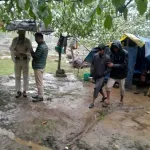Srinagar, Sept 29: The officials on Wednesday said the malaria cases in Jammu and Kashmir have been considerably low as compared to the other parts of the country.
They added with the aggressive awareness measures taken up by the administration, the disease will be soon controlled.
A senior official in the Directorate of Health Services Kashmir (DHSK) informed Rising Kashmir that aggressive awareness measures launched by the department have brought down the cases considerably low and added “Due to awareness programs about the disease the Jammu and Kashmir will be malaria-free soon”.
“In year 2022, the J&K UT registered several cases of malaria but the figure is however less as compare to other parts of the country”, the official said.
He said awareness campaign among masses has played a pivotal role in the elimination of malaria in Jammu and Kashmir. “The department is carrying out awareness programs aggressively in public aimed to aware them do’s and don’ts about the disease. The efforts put in place by the department have yielded good results so far owing to the UT of J&K reported less number of cases as compare to other parts of the country”, the official said.
Pertinently malaria is spread by the bite of an infected female Anopheles mosquito. The disease may also by spread by transfusion of blood from infected people or by the use of contaminated (dirty) needles or syringes. People with untreated or inadequately treated malaria may spread infection to a mosquito that bites them.
The official said that besides awareness programs, people are being made aware to use spray of chemicals in their surroundings, avoid children to sleep under open sky so that they will not be bitten by mosquito’s and also maintain proper hygiene.
Speaking to Rising Kashmir, another senior official of the DHSK informed that in last 20-years, no patient has died due to malaria in Jammu and Kashmir. “Though in last twenty-years many cases were reported in JK but fortunately they were treated timely and thus UT witnessed zero deaths by malaria”.
In 2011, 1091 cases of malaria were reported in Jammu and Kashmir including 1046 cases of Plasmodium Vivax (PV) and 46 cases of Plasmodium Falciparum (PF).
The Government of India (GoI) envisages eliminating malaria by 2030 in a phased manner with 15 states targeted for sub-national elimination by 2020, another 11 states by 2022 and 10 high burden states by 2027. Thus the entire country is envisaged to attain the status of ‘zero indigenous cases’ by 2027 maintain this status up to 2030 and get the WHO certification of malaria free India by 2030.
Malaria has been made notifiable in 31 States and UTs which include Andhra Pradesh, Arunachal Pradesh, Assam, Chhattisgarh, Goa, Gujarat, Haryana, Himachal Pradesh, Jammu & Kashmir, Jharkhand, Karnataka, Kerala, Madhya Pradesh, Manipur, Mizoram, Nagaland, Odisha, Punjab, Rajasthan, Sikkim, Tamil Nadu, Telangana, Tripura, Uttar Pradesh, Uttarakhand, West Bengal, Pudducherry, Chandigarh, Daman & Diu, Haveli and Lakshadweep.
The officials of the DHSK claimed that with aggressive awareness campaigns the administration will take absolute control on malaria very soon.
Malaria cases in J&K considerably low as compared to other parts of India: Health Officials
Leave a Comment Leave a Comment





